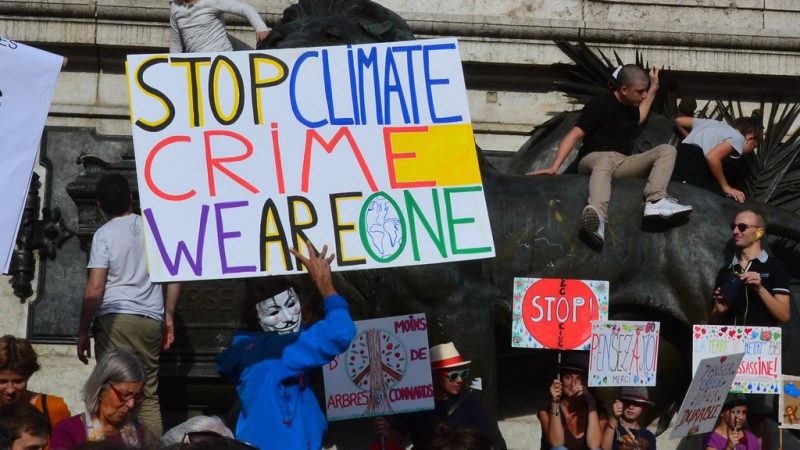'To tackle the phenomenon of climate anxiety that’s affecting nearly half of young people’s daily lives, we must create a sense of security that whatever the weather, our services and infrastructure will still work for us.'

Eloise Sacares is a researcher at the Fabian Society
Reducing emissions is the biggest challenge of the coming decades, but the reality of climate change is hitting us already. If Labour wins the next election, how will they help the country adapt to the climate challenges we are already facing, from extreme heat to drought and flooding?
The Joint Committee on the National Security Strategy showed climate change is already impacting critical national infrastructure and has the potential to create a series of ‘cascading’ risks. This can be seen in several recent incidents: Storm Arwen in late 2021 caused extended power and communication outages; and the summer 2022 heatwave (which was declared a national emergency) caused power cuts and transport disruptions.
This will only get worse. The Met Office predicts global weather patterns that could lead to severe flooding this coming February, and the National Infrastructure Commission (NIC) found that more than 600,000 properties face flooding in the future without investment in drainage. At the other extreme, Southeast England saw its driest July on record last year, and episodes of extreme heat are becoming more frequent, with over 4,000 heat-related deaths having been recorded in England since 2018.
The government’s plans to protect people from such adverse impacts are completely inadequate. We have already seen the grim consequences: untreated sewage is being pumped into rivers in times of heavy rainfall, with terrible impacts on human health and biodiversity. Instead of acting to stop these practices, the government is inexplicably going to make the situation even worse, as they are expected to further relax regulations on water pollution. Labour has campaigned to stop this and set out a new series of regulations they would implement if in government. But this is just the beginning. The government is simply burying its head in the sand on the myriad of other climate-related issues Britain is soon to face.
Adaptation to climate change might seem counter-intuitive – surely, we want to prevent climate catastrophe, not learn to live with it? But the reality of the situation is that the warming of the planet is already happening – climate disasters are occurring, extreme weather events are ever more frequent – and we need to prepare. It’s not about giving up, but about protecting the population from the effects of environmental change that are already happening. We need good, targeted policymaking and pragmatism – adapting to climate change may not create as flashy headlines as developing new renewable energy sources, but it is vital to protect the health and wellbeing of the UK.
However, public funds are scarce, and it is important to think about how this can be done in the most efficient way possible. Adaptation can’t detract from the necessity of preventing further climate change. The best solutions, therefore, are those that target both mitigation (tackling the causes of climate change to prevent further temperature rises) and adaptation at the same time. One key example is tree-planting – as well as acting as a carbon sink (taking carbon out of the atmosphere through photosynthesis), trees also directly intercept rainfall and infiltrate water from the soil, reducing flooding risk.
Natural solutions such as these are much cheaper than hard engineering measures and help retain vital biodiversity – as shown by the recent success of the Environment Agency’s 4-year pilots of natural flood management. Their sixty-pilot natural flood management projects have helped protect 15,000 homes and created storage for up to 1.6m cubic metres of flood water, while also helping nature recovery on 380 miles of river and 4,000 hectares of wetlands and woodlands.
Many of these interventions are popular with the public too. Campaigning to stop water pollution is a good start, but there are many other ways in which climate change will directly impact UK residents’ quality of life, unless we adapt now. When train lines buckle in heatwaves, when power or heating goes out during storms, when your house is suddenly flooded and the average cost of repair is £30,000, when you have no rights to stop work in extreme weather conditions – these are the issues that affect people’s daily lives.
To tackle the phenomenon of climate anxiety that’s affecting nearly half of young people’s daily lives, we must create a sense of security that whatever the weather, our services and infrastructure will still work for us. Public opinion research has found that a majority of the British the public favour stronger regulation to protect workers and the environment. As with so much of environmental politics, the right messaging and framing is the key to gaining broad public support.
If Labour takes office after the next election, they will inherit a backlog of urgent problems to deal with. As a top priority, they will need a plan to adapt to climate change, as well as prevent it from worsening, for the future security of the UK.
Left Foot Forward doesn't have the backing of big business or billionaires. We rely on the kind and generous support of ordinary people like you.
You can support hard-hitting journalism that holds the right to account, provides a forum for debate among progressives, and covers the stories the rest of the media ignore. Donate today.



